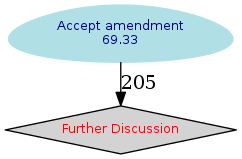General Resolution: Update Standard Resolution Procedure
Time Line
| Proposal and amendment | Monday, 26 October 2015 | |
|---|---|---|
| Discussion Period: | Friday, 30 October 2015 | |
| Voting Period: | Sunday, November 29st, 00:00:00 UTC, 2015 | Saturday, December 12th, 23:59:59 UTC, 2015 |
Proposer
Sam Hartman [hartmans@debian.org] [text of proposal] [Call for vote]
Seconds
- Martin F. Krafft [madduck@debian.org] [mail]
- Didier Raboud [odyx@debian.org] [mail]
- Jakub Wilk [jwilk@debian.org] [mail]
- Gunnar Wolf [gwolf@debian.org] [mail]
- Philip Hands [philh@debian.org] [mail]
- Scott Kitterman [kitterman@debian.org] [mail]
- Don Armstrong [don@debian.org] [mail]
- Joerg Jaspert [joerg@debian.org] [mail]
Text
Choice 1
Constitutional Amendment: TC Supermajority Fix
Prior to the Clone Proof SSD GR in June 2003, the Technical
Committee could overrule a Developer with a supermajority of 3:1.
Unfortunately, the definition of supermajorities in the SSD GR has a
off-by-one error. In the new text a supermajority requirement is met
only if the ratio of votes in favour to votes against is strictly
greater than the supermajority ratio.
In the context of the Technical Committee voting to overrule a
developer that means that it takes 4 votes to overcome a single
dissenter. And with a maximum committee size of 8, previously two
dissenters could be outvoted by all 6 remaining members; now that
is no longer possible.
This change was unintentional, was contrary to the original intent
of the Constitution, and is unhelpful.
For the avoidance of any doubt, this change does not affect any
votes (whether General Resolutions or votes in the Technical
Committee) in progress at the time the change is made.
Therefore, amend the Debian Constitution as follows:
Index: doc/constitution.wml
===================================================================
--- doc/constitution.wml (revision 10982)
+++ doc/constitution.wml (working copy)
@@ -913,7 +913,7 @@
</li>
<li>
An option A defeats the default option D by a majority
- ratio N, if V(A,D) is strictly greater than N * V(D,A).
+ ratio N, if V(A,D) is greater or equal to N * V(D,A) and V(A,D) is strictly greater than V(D,A).
</li>
<li>
If a supermajority of S:1 is required for A, its majority ratio
Constitutional Amendment: Fix duplicate section numbering.
The current Debian Constitution has two sections numbered A.1.
This does not currently give rise to any ambiguity but it is
undesirable.
Fix this with the following semantically neutral amendment:
- Renumber the first section A.1 to A.0.
Quorum
With the current list of voting developers, we have:
Current Developer Count = 1014
Q ( sqrt(#devel) / 2 ) = 15.9216833280907
K min(5, Q ) = 5
Quorum (3 x Q ) = 47.7650499842720
Quorum
- Option1 Reached quorum: 208 > 47.7650499842720
Data and Statistics
For this GR, like always, statistics will be gathered about ballots received and acknowledgements sent periodically during the voting period. Additionally, the list of voters will be recorded. Also, the tally sheet will also be made available to be viewed.
Majority Requirement
The proposal needs a 3:1 majority
Majority
- Option1 passes Majority. 69.333 (208/3) >= 3
Outcome
In the graph above, any pink colored nodes imply that the option did not pass majority, the Blue is the winner. The Octagon is used for the options that did not beat the default.
- Option 1 "Accept amendment"
- Option 2 "Further Discussion"
In the following table, tally[row x][col y] represents the votes that option x received over option y. A more detailed explanation of the beat matrix may help in understanding the table. For understanding the Condorcet method, the Wikipedia entry is fairly informative.
| Option | ||
|---|---|---|
| 1 | 2 | |
| Option 1 | 208 | |
| Option 2 | 3 | |
Looking at row 2, column 1, Further Discussion
received 3 votes over Accept amendment
Looking at row 1, column 2, Accept amendment
received 208 votes over Further Discussion.
Pair-wise defeats
- Option 1 defeats Option 2 by ( 208 - 3) = 205 votes.
The Schwartz Set contains
- Option 1 "Accept amendment"
The winners
- Option 1 "Accept amendment"
Debian uses the Condorcet method for voting.
Simplistically, plain Condorcets method
can be stated like so :
Consider all possible two-way races between candidates.
The Condorcet winner, if there is one, is the one
candidate who can beat each other candidate in a two-way
race with that candidate.
The problem is that in complex elections, there may well
be a circular relationship in which A beats B, B beats C,
and C beats A. Most of the variations on Condorcet use
various means of resolving the tie. See
Cloneproof Schwartz Sequential Dropping
for details. Debian's variation is spelled out in the
constitution,
specifically, A.6.
Debian Project Secretary

